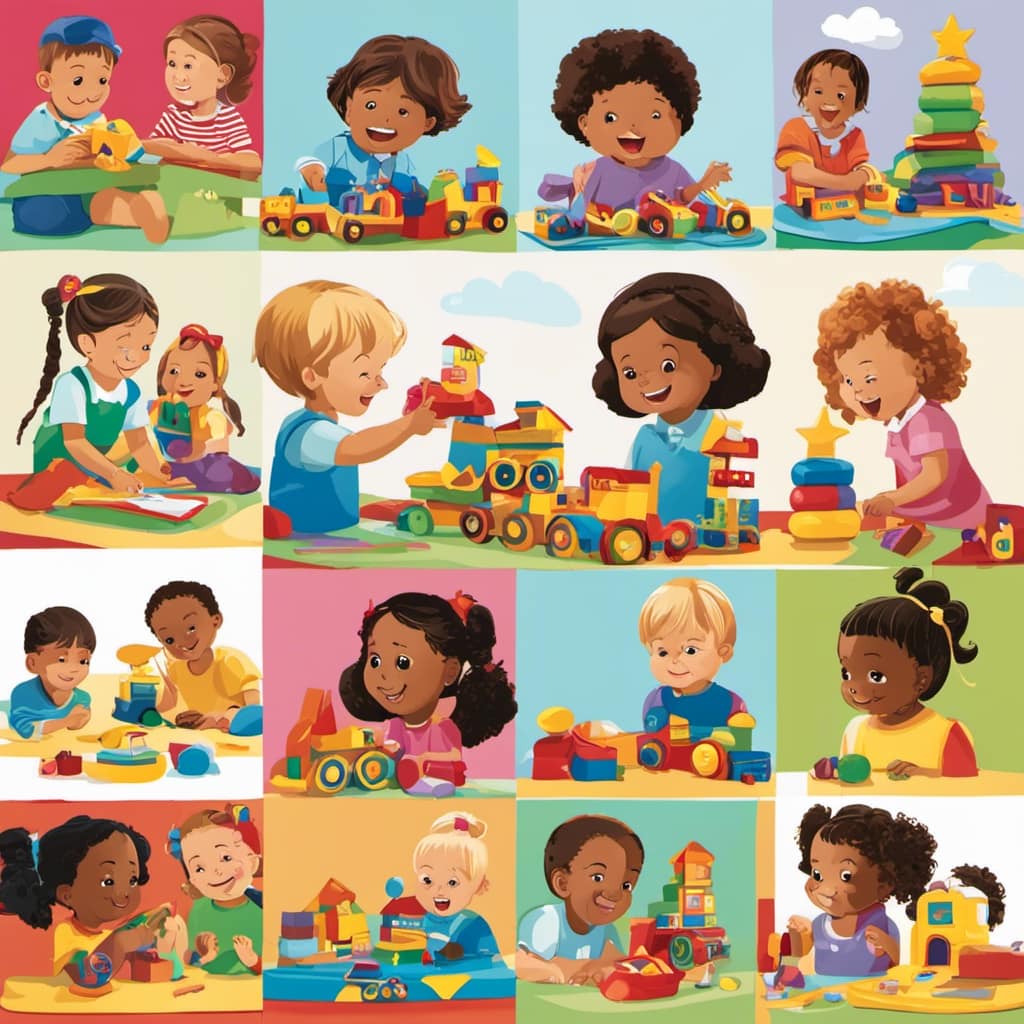As a writer, I am eager to delve into the captivating topic of how nurture shapes behaviors and personalities during childhood development.
It’s common knowledge that the environment plays a pivotal role in shaping who we become, while genetics determine our physical characteristics.
However, I am excited to explore the various environmental factors, such as parenting styles, cultural influences, and socialization, that contribute to a child’s development.
So, let’s embark on this journey together and uncover the intricate ways in which nurture impacts the growth and development of our little ones.
Key Takeaways
- Nurture plays a significant role in shaping a child’s behavior and personality.
- Environmental factors have a profound impact on a child’s development.
- Parenting styles, access to education, socio-economic status, and community support also influence child development.
- Exposing children to various social environments and meaningful interactions contribute to healthy social and emotional growth.
The Role of Environmental Factors
Environmental factors have a profound impact on a child’s development, shaping their behaviors and personalities. One significant environmental factor that affects child development is technology. The effects of technology on child development are a growing concern in today’s digital age.
Excessive screen time can lead to developmental delays, attention problems, and decreased social skills. It is important for parents and caregivers to monitor and regulate their child’s technology usage to ensure healthy development.

Another crucial environmental factor is the importance of community support in nurturing child development. Communal living and extended family networks provide support, guidance, and a sense of belonging for children. Community support helps children develop social skills, emotional well-being, and a strong sense of identity.
Therefore, creating and maintaining a supportive community environment is essential for fostering positive child development.
Cultural Influences on Behavior and Personality
Growing up in a diverse community has exposed me to various cultural influences that shape my beliefs and values.
Cultural beliefs and socialization practices have a profound impact on behavior and personality development.
Cultural beliefs refer to the shared values, norms, and attitudes that are passed down from one generation to another within a particular group. These beliefs shape how individuals perceive the world and interact with others.
Socialization practices, on the other hand, refer to the methods through which individuals learn and internalize cultural beliefs and behaviors. This includes the role of family, education, and community in transmitting cultural values and social norms.

Parenting Styles and Their Impact
Being a parent myself, I have experienced firsthand how different parenting styles can greatly influence a child’s upbringing.
Research has shown that parenting styles have a significant impact on a child’s academic performance and self-esteem.
For instance, authoritative parenting, characterized by warmth, support, and clear boundaries, has been linked to positive outcomes such as higher self-esteem and better social skills.
On the other hand, authoritarian parenting, which is strict and controlling, can lead to negative psychological effects like low self-esteem and anxiety.
Additionally, permissive parenting, where rules and boundaries are lacking, has been associated with poor self-regulation and lower academic performance.
It is important for parents to be aware of their parenting style and its potential effects on their child’s development, as each child responds differently to different parenting styles.

Socialization and Healthy Development
Exposing my child to various social environments and facilitating meaningful interactions has been crucial for their healthy development. Through playdates and social interactions, they have learned valuable social skills, such as sharing, taking turns, and cooperating. These skills are essential for building positive relationships and navigating social situations.
Additionally, playdates provide opportunities for language development, as children engage in conversations and learn to express themselves effectively. This, in turn, boosts their self-confidence and self-esteem.
Meaningful interactions with peers and adults contribute to their social and emotional growth, helping them develop empathy, resilience, and problem-solving skills.
Factors Influencing Child Development
As a parent, I have noticed that various environmental factors significantly influence my child’s overall development and readiness for future success.
Economic factors play a crucial role in child development. Research shows that children from low-income families often face challenges in accessing quality education, healthcare, and resources that can hinder their cognitive and socio-emotional development. On the other hand, children from higher socio-economic backgrounds tend to have more educational opportunities, access to extracurricular activities, and resources that enhance their overall development.
Educational opportunities are also essential for child development. A quality education can provide children with the necessary skills, knowledge, and opportunities for future success. It can contribute to their cognitive, social, and emotional development, allowing them to reach their full potential.

Therefore, it is crucial for parents and society to prioritize economic factors and educational opportunities to ensure optimal child development and future success.
Nurturing Behaviors and Personalities
I have observed that my nurturing behaviors and interactions with my child greatly influence their growth and individuality. Through positive reinforcement, I have seen how my encouragement and support can shape their behaviors and personalities.
By praising their accomplishments and providing a nurturing environment, I have noticed that they develop a strong sense of self-esteem and confidence.
Additionally, I have recognized the significant role that siblings play in shaping behaviors and personalities. Through sibling interactions, children learn important social skills such as sharing, cooperation, and conflict resolution. Siblings also provide emotional support and serve as role models, influencing their siblings’ attitudes and behaviors.
It is crucial to foster a nurturing environment and encourage positive sibling relationships to promote healthy development and character formation.
Frequently Asked Questions
How Do Genetics Play a Role in Shaping a Child’s Behavior and Personality?
Genetics and environmental factors both play a role in shaping a child’s behavior and personality. While genetics determine physical characteristics, the environment influences behavior and personality through cultural influences, parenting styles, and socio-economic status.

What Are Some Examples of Environmental Factors That Can Lead to Developmental Delays in Children?
Environmental factors such as socioeconomic status, parenting styles, educational opportunities, nutrition and health, exposure to toxins, access to healthcare, family dynamics, trauma and abuse can lead to cognitive impairments and developmental delays in children.
How Do Different Cultural Influences Shape a Child’s Beliefs and Values?
Different cultural influences shape a child’s beliefs and values. Cultural norms, traditions, and practices play a significant role in shaping a child’s worldview. Socialization within different cultural contexts helps children develop their sense of identity and understanding of the world.
Can Parenting Styles Change Over Time, or Are They Fixed?
Parenting styles can change over time due to evolving societal norms and cultural shifts. As society progresses, parents may adapt their approaches to better meet the needs of their children and reflect current research on child development.
Are There Any Negative Effects of Socialization on a Child’s Development?
Negative effects of socialization can impact a child’s development. While genetics influence behavior and personality, environmental factors play a significant role. Cultural influences, parenting styles, and fixed beliefs/values can all contribute to negative outcomes.
Conclusion
In conclusion, the impact of nurture on child development is undeniable. Environmental factors greatly shape a child’s behavior and personality, including parenting styles and cultural influences.
One interesting statistic that evokes an emotional response is that children who experience authoritative parenting are 20% more likely to develop positive self-esteem and have better mental health outcomes compared to those with authoritarian or permissive parenting styles.

This highlights the importance of creating nurturing environments that foster healthy development and emotional well-being in children.










